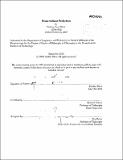| dc.contributor.advisor | Richard Holton. | en_US |
| dc.contributor.author | Sliwa, Paulina Anna | en_US |
| dc.contributor.other | Massachusetts Institute of Technology. Dept. of Linguistics and Philosophy. | en_US |
| dc.date.accessioned | 2013-03-13T15:48:49Z | |
| dc.date.available | 2013-03-13T15:48:49Z | |
| dc.date.copyright | 2012 | en_US |
| dc.date.issued | 2012 | en_US |
| dc.identifier.uri | http://hdl.handle.net/1721.1/77802 | |
| dc.description | Thesis (Ph. D.)--Massachusetts Institute of Technology, Dept. of Linguistics and Philosophy, 2012. | en_US |
| dc.description | Cataloged from PDF version of thesis. | en_US |
| dc.description | Includes bibliographical references (p. 83-86). | en_US |
| dc.description.abstract | This dissertation is about agents like us, who are both epistemically flawed and morally imperfect. First, how should such agents form and revise their moral beliefs? Second, how should we morally evaluate the actions of such agents - under which conditions do their actions have moral worth? I approach these questions by focusing on moral testimony. Moral testimony is particularly interesting in this context because we often rely on it to compensate for our moral and epistemic imperfections. Yet it has been viewed with suspicion by moral philosophers and epistemologists alike. I argue that these suspicions are unfounded: moral testimony is an important source of moral knowledge - in some situations it is the only source of moral knowledge available to agents like us - and actions on the basis of moral testimony can have moral worth. In arguing for this conclusion, I develop a novel account of moral worth. I argue that moral knowledge is central to moral worth. 'he epistemic question about how we should form our moral beliefs and the moral question about when our actions are morally praiseworthy turn out to be closely related. | en_US |
| dc.description.statementofresponsibility | by Paulina Anna Sliwa. | en_US |
| dc.format.extent | 86 p. | en_US |
| dc.language.iso | eng | en_US |
| dc.publisher | Massachusetts Institute of Technology | en_US |
| dc.rights | M.I.T. theses are protected by
copyright. They may be viewed from this source for any purpose, but
reproduction or distribution in any format is prohibited without written
permission. See provided URL for inquiries about permission. | en_US |
| dc.rights.uri | http://dspace.mit.edu/handle/1721.1/7582 | en_US |
| dc.subject | Linguistics and Philosophy. | en_US |
| dc.title | Praise without perfection | en_US |
| dc.type | Thesis | en_US |
| dc.description.degree | Ph.D. | en_US |
| dc.contributor.department | Massachusetts Institute of Technology. Department of Linguistics and Philosophy | |
| dc.identifier.oclc | 828402149 | en_US |
